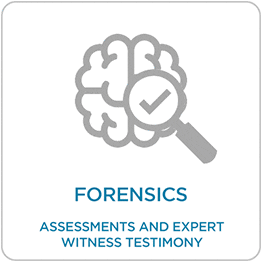Forensic Assessments: Understanding Their Purpose and Importance
We help uncover the truth of a matter when it matters most.
Forensic assessments are a critical tool in the criminal justice system. These assessments help inform legal decisions and provide valuable information about an individual's mental health, risk factors, and potential for future criminal behavior. In this article, we will explore the purpose and importance of forensic assessments.
What is a Forensic Assessment?
A forensic assessment is a comprehensive evaluation of an individual's mental health, personality, and behavior. These assessments are typically conducted by mental health professionals who specialize in forensic psychology. The goal of a forensic assessment is to provide objective and reliable information that can be used to inform legal decisions.
It is a specialized branch of psychological assessment, forensic assessment focuses on legal matters. Unlike therapeutic assessments used for treatment planning, forensic evaluations require specialized training and follow specific guidelines to inform legal decisions. These assessments can occur in diverse settings, ranging from law enforcement to correctional facilities and courtrooms in both civil and criminal cases. Forensic evaluators utilize a combination of traditional psychological tests and specialized forensic tools tailored to answer specific legal questions.
Forensic assessments may be used in a variety of legal contexts, including criminal and civil cases. Some common types of forensic assessments include:
Competency evaluations:
These assessments are conducted to determine whether an individual is competent to stand trial or make legal decisions.
Criminal responsibility evaluations:
These assessments are conducted to determine whether an individual was legally responsible for their actions at the time of the offense.
Violence risk assessments:
These assessments are conducted to evaluate an individual's potential for future violent behavior.
Child Custody Evaluations:
These assessments are conducted to help determine the best interests of a child in a custody dispute.
Why are Forensic Assessments Important?
- Forensic assessments are important for several reasons. First, they provide valuable information that can inform legal decisions. Judges and attorneys rely on the information gathered during forensic assessments to make decisions about competency, criminal responsibility, and sentencing.
- The assessments help ensure that individuals are treated fairly within the criminal justice system. By providing an objective evaluation of an individual's mental health and behavior, forensic assessments can help to prevent wrongful convictions or harsh sentencing.
- Forensic assessments can help identify individuals who may be at risk for future criminal behavior. Violence risk assessments, for example, can help identify individuals who may benefit from mental health treatment or other interventions that can reduce their risk of committing future violent acts.
- Forensic assessments can help improve the overall functioning of the criminal justice system. By providing accurate and reliable information, forensic assessments can help to reduce delays and increase efficiency in legal proceedings.
Challenges in Forensic Assessments
While forensic assessments are an essential tool in the criminal justice system, they are not without their challenges. One of the biggest challenges in forensic assessments is ensuring that the assessment is conducted in an objective and unbiased manner. Forensic assessors must be trained to remain impartial and avoid any preconceived notions or biases that could influence their evaluation.
Another challenge in forensic assessments is ensuring that the assessment is conducted using reliable and valid methods. Forensic assessments must be based on the best available research and conducted using standardized procedures to ensure the accuracy and reliability of the results.
Finally, there are challenges in ensuring that forensic assessments are conducted in a timely manner. Delays in forensic assessments can result in prolonged legal proceedings, which can be costly and time-consuming.
Forensic assessments are a critical tool in the criminal justice system. These assessments provide valuable information that can inform legal decisions, ensure fairness, identify individuals at risk for future criminal behavior, and improve the overall functioning of the criminal justice system. While there are challenges in conducting forensic assessments, these challenges can be overcome with proper training, standardized procedures, and efficient processes.

Recommended Treatment for:
Any forensic assessments need to go through an attorney. The attorney contacts us with basic information and we schedule a brief call with Dr. Serin if she can possibly take on the assessment. In general, assessments take about 4 weeks to complete with an intake appointment, 2 days of testing 3-4 hours each, and then a feedback/results session with a report. We would not decide who would do the assessment until we understand the nature of it. The cost varies per assessment and it depends on what is being assessed, which doctor or psychometrist is completing the assessment, what records need reviewing, and how fast the patient takes all of the tests.
At Serin Center, our team of experts leverages the power of neuroscience to create personalized therapy plans that help children, teens, adults, families, and business leaders overcome challenges and reach their full potential.
Take control of your mental and emotional well-being with groundbreaking applied neuroscience therapy at Serin Center. You may visit our clinics in Peoria, AZ, and Scottsdale, AZ, to book an appointment with us. Get ready to upgrade your life - contact us today to see how we can help you, your child, or your teen thrive!
